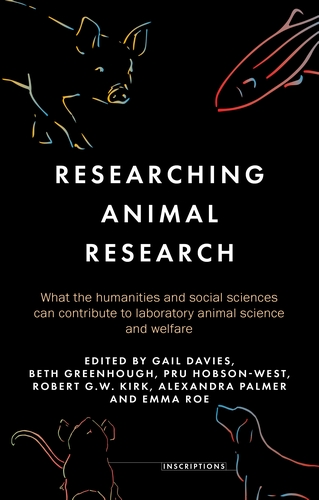Announcing the publication of Researching Animal Research
Announcing the publication of Researching Animal Research
We are excited to announce our new edited volume – Researching Animal Research – forthcoming (January 2024) with Manchester University Press. Looking back over everything that has emerged from our six - year collaboration as the Animal Research Nexus, Researching Animal Research in many ways epitomizes what our project has come to stand for.

Firstly, it is above all collaborative, reflecting both our own connections across disciplines, career stages and trajectories as the Animal Research Nexus team, and the relationships we have built with stakeholders and fellow academics across the animal research community, many of whom have offered chapters and commentaries as part of this edited volume. Therefore, in Researching Animal Research, you will find chapters written by historians, geographers, sociologists, anthropologists, science and technology scholars, and engagement professionals, alongside contributions from those working in the arts, social sciences, and animal research sector. We don’t always agree, but what we share is a commitment to being open to conversations across differences, identifying places where we might usefully work together, and others where we remain in productive tension.
Secondly, Researching Animal Research showcases what the social sciences and humanities can bring, both to conversations about the future of animal research, but also to Science and Technology Studies (STS) and allied fields. Researching Animal Research is impactful; part of a growing strand of engaged STS which seeks to make an active contribution to human and animal welfare in the field of animal research. Chapters in the edited volume offer insights into the history and contemporary practice of animal research which provoke reflection on how we came to current social arrangements which permit the use of some animals for the purposes of animal research, the impact of this work on both animals and the humans who work with them, and reflections on what this might mean for the future. For scholars of Science and Technology Studies we show how concepts such as coproduction, care, expertise and public engagement might be nuanced through attention to how this are put into practice through the governance and practice of animal research. We also foreground the concept of nexus as a way of approaching the complex web of connections that make up animal research. Paying attention to diverse histories, species, spaces, commercial and professional arrangements, stakeholders and publics, we identify the challenging structures and pressures which cause humans to both care for animals and subject them to (albeit heavily regulated) scientific procedures, grapple with dual commitments to both scientific progress and animal welfare, and experiment with new forms of public and patient engagement, with scope for further learning and development on all sides.
Thirdly, Researching Animal Research also offers insights into what we hope will be our project’s legacy, seen both in the collaborations, conversations and insights outlined above, but also in the form of novel, creative toolkits and resources for facilitating conversations into the future, through resources such as the award-winning Mouse Exchange (public engagement), Vector (an immersive theatre production), Care-full Stories (a culture of care training resource) and experiments with labelling medicines and patient engagement. Here our work showcases how collaborations with artists, storytellers and creative practitioners can not only serve to communicate research but act as a catalyst for research insight, collaboration and impact.
We would like to close by taking a moment to thank all those involved in bringing this volume together, and in particular all those who provided contributions and commentaries. This would not have been possible without you.